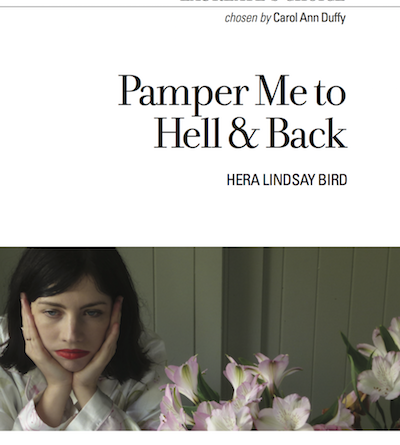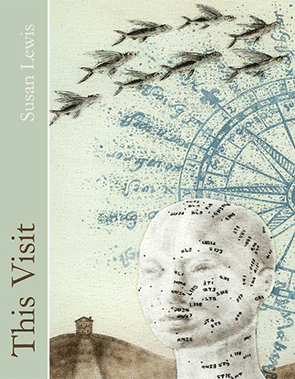Pamper Me to Hell & Back by Hera Lindsay Bird
– Reviewed by Becky Varley–Winter –
In Pamper Me to Hell & Back, Hera Lindsay Bird keeps running through wildflowers and graveyards:
overcome with wildflowers AGAIN, and the poem isn’t even halfway over yet
[‘I want to get high my whole life with you’]
your teeth like a graveyard …….. in springtime
your tongue like a mattress …….. in a graveyard ………… in springtime
your tongue on my cunt like a mattress …….. in a graveyard ………… in springtime[‘I am so in love with you I want to lie down in the middle of a major public intersection and cry’]
[…] the pressure of what is unspoken
becomes impossible to hold back
and articulates itself within the body
like mice, running wild through a field of burning grass[‘I knew I loved you when you showed me your Minecraft world’]
The only reason for poetry is to have a meadow in which to burn yourself
alive […][‘Speech time’]
It’s as if all the poems take place in one springy exuberant field, with graves scattered through it. Bird circles back to recurring preoccupations, sometimes directly repeating herself, making the poems converse. Her sarcasm and humour, always self-conscious, coexists with a sincere fizzing excitement, and this energy keeps bursting through the seemingly-casual surface of her work like a marigold through a skull. Humour is often a form of self-defence, and by allowing these registers – jokey and heartfelt – to overlap and become indistinguishable, Bird writes poems greater than the sum of their parts.
The longer poems in this pamphlet allow fluctuations of thought and mood to emerge, and are generally my favourites. What the poem thinks it is about unfurls into something else altogether, or even ten different-but-related ideas. Bird’s more compact poems feel less ungovernable, and so less interesting; the opening poem, ‘Bruce Willis you are the ghost’, is comparatively one-note, although it gives a taste of the pamphlet’s ongoing themes of love and (imagined or feared) death. In ‘Everything is about to go wrong forever’, I amble through the first page feeling patiently-entertained, but by the second page Bird is on a roll, imagining increasingly terrible events to match her speaker’s sense of nameless dread:
maybe my boyfriend will slowly die of cancer
maybe my boyfriend will slowly die of cancer, and just before he dies he will
leave me for his beautiful French oncologist who has better hair than me
you may think I’m being melodramatic
but every day the worst thing that has ever happened to somebody
is happening to somebody
I feel mine getting closer, and closer
I feel it in the back of my mouth, where all my teeth are slowly turning black
The poem grows out of a joke, but Bird pushes her jokes through slapstick into quieter truths, such as “Some things cannot be transformed, only endured”. She structures her poems predominantly through repetition, which contributes to her sense of rhythm, and allows her to test ideas from different angles, seeing what sticks:
i no longer think pain is meaningful
i never learned anything good from being unhappy
i never learned anything good from being happy either
the way I feel about you has nothing to do with learning
it has nothing to do with anything
but i feel it deep down in the corners of my sarcophagus
In holding such feelings up to the light, Pamper Me to Hell & Back becomes surreptitiously thoughtful. It would be a mistake to call Bird’s style unprecedented or without guides (one of her influences is Chelsey Minnis), but she’s scornful of prohibitions (“It’s a great stupidity to waste your life on right-seeming behaviour”, she writes). When writing can so often feel like crossing a ravine full of unseen rules, like invisible crocodiles, it’s revitalising to watch someone tightrope-dance across the abyss. Bird references pop culture, feminism, work and economics, but love’s the animating force here (“That great dark blue sex hope that keeps coming true”), and she translates its bubbling sensations brilliantly. “i don’t know how to write a love poem / because love is indescribable”, she writes, then sets out to prove herself wrong.





